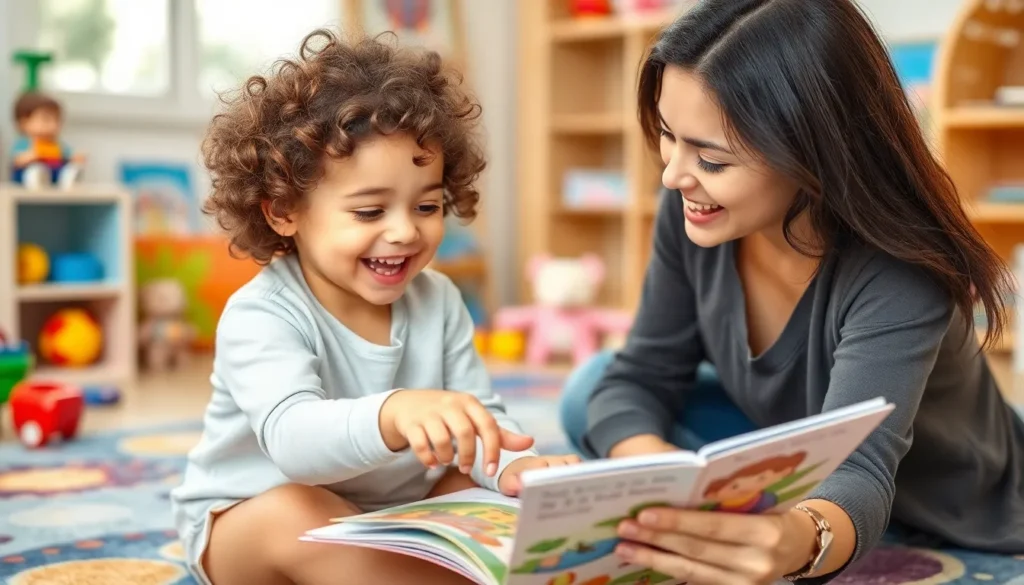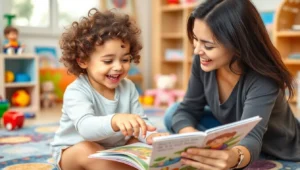Table of Contents
ToggleIn a world where emojis often speak louder than words, language development support is more crucial than ever. It’s not just about teaching kids to say “hello” without tripping over their tongues; it’s about equipping them with the tools to express their thoughts, feelings, and the occasional dad joke. After all, who wouldn’t want a future generation that can articulate their brilliance and their punchlines?
Understanding Language Development Support
Providing language development support is crucial in helping children navigate communication in an emoji-driven world. This support equips kids with essential skills to express thoughts, emotions, and humor effectively.
Importance of Early Language Development
Early language development significantly influences a child’s cognitive and social skills. Research shows that children exposed to rich language experiences are more likely to excel in reading and writing later. Engaging in conversations, reading together, and encouraging storytelling fosters a love for language. These interactions help shape a child’s ability to communicate confidently, benefiting their academic success and personal relationships.
Key Components of Language Development Support
Creating an enriching language environment involves various key components. Interactive reading sessions expose children to diverse vocabulary and sentence structures. Encouraging play-based learning introduces new concepts and nurtures critical thinking. Adult involvement through active listening and meaningful responses promotes language skills and emotional connections. Additionally, integrating visual aids aids comprehension and retention, making learning enjoyable and effective. Each component plays a vital role in supporting a child’s language journey.
Strategies for Language Development Support

Supporting language development involves employing effective strategies. Various interactive techniques and the role of reading and storytelling are crucial components.
Interactive Techniques
Engaging children through interactive techniques promotes language skills. Activities like role-playing encourage conversation and vocabulary use. Games that involve turn-taking enhance communication abilities. Including music or songs incorporates rhythm and repetition, which aids memory. Utilizing visuals, such as flashcards or illustrations, reinforces word meanings. Parents and caregivers can ask open-ended questions to develop critical thinking and elaboration. Each of these interactive techniques fosters a stimulating environment that nurtures language growth.
Role of Reading and Storytelling
Reading and storytelling create foundational skills for language development. Sharing books allows children to encounter diverse vocabulary and sentence structures. Storytelling encourages imagination and comprehension, vital for coherent expression. Discussing story elements fosters critical thinking and conversational skills. Reading aloud regularly helps strengthen listening skills and prompts expressive language. Making stories a shared experience promotes a love for language that extends beyond the classroom. Each of these practices contributes to a child’s linguistic and cognitive abilities, enriching their language development journey.
The Role of Caregivers and Educators
Caregivers and educators play a crucial role in supporting language development. Their involvement enhances children’s ability to communicate effectively and confidently.
Supporting Language Development at Home
Creating an engaging home environment fosters language skills. Regular conversations expose children to diverse vocabulary. Reading bedtime stories not only builds comprehension but also strengthens the bond between caregiver and child. Using everyday situations as learning opportunities encourages children to express their thoughts. Watching educational shows together can further complement language growth.
Classroom Strategies for Language Support
Classrooms serve as essential hubs for language development. Teachers can implement interactive reading sessions that promote engagement and understanding. Group activities like storytelling and role-playing allow students to practice language in real-life contexts. Incorporating music into lessons makes learning enjoyable and memorable. Using visual aids such as charts and pictures enhances comprehension. Each of these strategies significantly contributes to a child’s language skills and overall cognitive growth.
Challenges in Language Development Support
Language development support faces various challenges. Identifying language delays at an early stage poses a significant obstacle. Caregivers and educators must be vigilant in observing speech patterns, articulation, and word usage. Detecting a delay can sometimes be difficult since children develop at different rates. Recognizing typical benchmarks helps ensure that interventions occur in a timely manner.
Effective interventions play a crucial role in overcoming language development challenges. Tailoring strategies to fit the child’s specific needs is essential. Utilizing play-based learning, interactive reading sessions, and targeted activities fosters growth. Regular assessment of progress and adaptability in approaches can enhance outcomes. Collaborating with speech-language pathologists often provides additional expertise and support. Engaging with families ensures consistency, reinforcing new skills both at home and in educational settings.
Supporting language development is vital for nurturing effective communicators in a rapidly changing world. By fostering rich language experiences early on, caregivers and educators can lay the groundwork for children’s cognitive and social success. Engaging in interactive activities and creating supportive environments not only enhances vocabulary but also builds confidence in expression.
Recognizing the signs of language delays and implementing tailored strategies can make a significant difference in a child’s journey. Collaboration among families, educators, and specialists ensures that children receive the comprehensive support they need. As they grow, these foundational skills will empower them to articulate their thoughts and connect with others meaningfully. Investing in language development today shapes a brighter future for tomorrow’s communicators.





